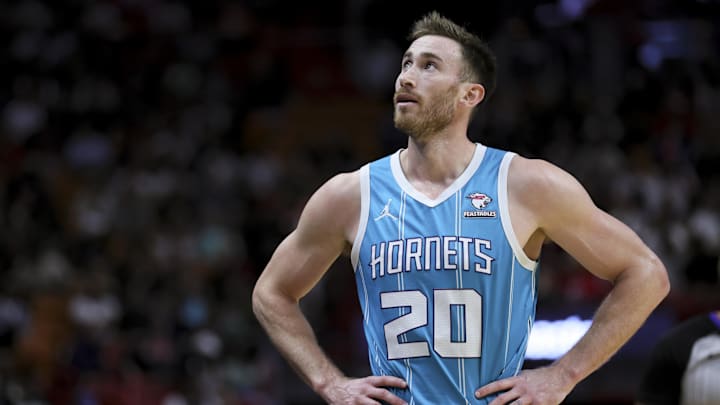The Oklahoma City Thunder have made their first trade deadline maneuver, acquiring veteran forward Gordon Hayward from the Charlotte Hornets. In exchange, Oklahoma City is sending Charlotte Vasilije Micic, Tre Mann, Davis Bertans, and two future second-round picks. As with all transactions in the NBA, there are pros and cons for each team.
Let’s dive right into the pros for the Thunder.
Pros of trading for Gordon Hayward
It is so exciting to see the Thunder make a move for a veteran talent. After a couple years of tanking and trading for draft capital, it feels like OKC is turning the corner towards championship contention. This young squad has outperformed their preseason expectation, and are gearing up for a real playoff run.
The Thunder have been racking up wins in the regular season, but haven’t had much opportunity in the playoffs yet. Outside of Gordon Hayward, the entire OKC roster combined has played only 30 playoff games.
Gordon Hayward by himself has been in 29 playoff games. While it’s difficult to quantify the value of experience, I think that adding someone who has been to a conference finals can only be good for this team.
The Thunder’s forward rotation has been pretty spotty this season. Daigneault has relied on guards to play up from their natural position, which has been fairly effective. They might run into problems, though, if they match up in the playoffs against a team with more size. I’m thinking about the Lakers or the Pelicans as potentially troublesome opponents.
Bringing in Gordon Hayward doesn’t solve this issue, but it is a step in the right direction. His fit within the Thunder system is very nice. He can drive the ball, make quick decisions, and hit corner threes. If the ball ended up in his hand with five seconds on the shot clock, I feel confident in Hayward’s ability to get a good shot.
Vasilije Micic was carving out a nice role as a facilitator off the bench. His inclusion in the deal has me thinking that Giddey might take those bench minutes. This means Giddey could play a role more natural for him as a primary ballhandler. Hayward could slot into the 3&D role with the starters that Giddey was being clunkily thrust into.
From a front office perspective, this deal is low-risk, high-reward. Hayward’s contract expires at the end of this season. There’s no long-term cap entanglement with this trade. In fact, the Thunder’s cap flexibility has increased by moving Micic, who has a 3 year contract with a team option on the last season.
The players that OKC traded away were not likely to contribute much in the postseason. Hayward, on the other hand, could end up being a key component to a deep run.
Remember Oklahoma City signing Derek Fisher after his buyout back in 2012. A veteran bench piece who played an important, albeit a small role for a young contender. I think that Hayward, if he stays healthy, has a chance to be a much better version of what Fisher was for the Thunder’s first title run.
Cons of trading for Gordon Hayward
Which brings us to our cons. The biggest of course being health. Optimistic fans have been using the phrase “if he stays healthy” about Gordon Hayward for at least five years. And more often than not, Hayward has been unable to deliver when it comes to staying on the floor.
Gordon Hayward has missed 128 of 296 games (that's 43%) due to injuries during his three-plus seasons with the Charlotte Hornets, including 25 of 50 this season.
— Steve Reed (@SteveReedAP) February 8, 2024
Hayward’s time as a Charlotte Hornet was pretty miserable. The team was never able to finish the season higher than the 10th seed, and suffered blowout losses in consecutive Play-In Tournament games in 2021 and 2022. Hayward was unable to play in either of those postseason matchups due to injury.
Hayward is set to return soon from a calf injury that has had him sidelined since December. While a bet on Hayward’s health is pretty dubious, we can consider that he’s going to have a smaller role in OKC than he had in Charlotte. I think it’s safe to assume he’s not going to be playing 32 minutes per game like has so far this season.
In addition to the injury concerns, Hayward is not exactly a lights-out defender. As with all 30-something athletes, he’s lost some agility and lateral quickness. Funny enough though, OKC is probably still improving their defense with this move. Mann, Micic, and Bertans were all among the bottom half of Thunder defenders.
While bringing in a vet like Hayward can be good for the locker room, I am sad about the guys OKC is giving up. Outside of the big three, Micic was my personal favorite OKC player to watch this season. It’s going to hurt seeing him dish no-look passes in a “Buzz City” jersey. As for Bertans, it did seem pretty inevitable that he was going to be traded.
Clearly Tre Mann is beloved by his Thunder teammates, and is going to be missed. There is one last pro for this trade, which is that Mann can finally show his ability to contribute to an NBA roster.
The Thunder’s guard rotation was too stacked to allow for Tre Mann to get much playing time. Charlotte will be a good spot for Mann to show off his shot creation ability and hopefully start to change the culture of the Hornets organization.
All in all, this trade feels positive for the Thunder, but I would place a big “TBD” stamp on it until after the postseason unfolds. If he spends the bulk of his time on the bench and in the trainer’s room, we’ll call it a swing and a miss. If Hayward lives up to what he is capable of and contributes to playoff wins, then it’s a clear victory for Oklahoma City.
